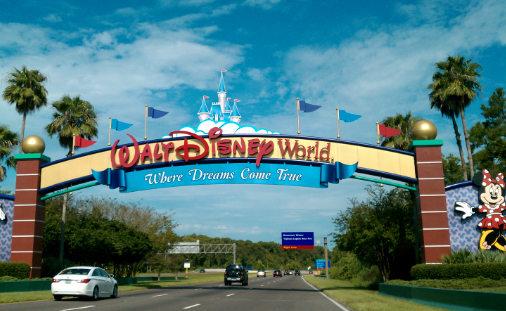Disney v. DeSantis: The Gray Between Government and Business

Photo Courtesy of Wikimedia Commons by Denis Adriana Macias
Stationed in Orlando, Florida, Disney World has been at the focal point of the lawsuit between Florida Governor Ron DeSantis and Disney.
May 18, 2023
In March of 2022, Florida Governor Ron DeSantis signed a bill called the Parental Rights in Education into law that forbade the instruction/discussion of sexual orientation and gender identity in kindergarten through third grade classrooms. This quickly sparked controversy as many openly protested the bill, citing it as discriminatory and marginalizing to members of the LGBTQIA+ community. Among these critics was the world-famous Walt Disney company. Disney openly disavowed DeSantis’ actions and suspended their political donations to the state of Florida. This would spark an ongoing fight between the two, leading to Disney suing DeSantis a year later.
Disney officially has filed a lawsuit against DeSantis and other officials within the Florida government after a board elected by DeSantis voided Disney’s control over their own theme park district. While this might seem unusual, Disney has had governing control over the Reedy Creek Improvement District since 1967 when Walt Disney and his company requested such a power during the planning stages of Disney World. This granted the company the same authority of a county government, such as maintenance of roads, construction permits and building codes.
Taking away this power from Disney could be so damaging to the company to the point that some of Disney’s officials are worried that the business could become unprofitable. There would also be heavy restrictions put on the company and its property as DeSantis would be the one to elect a board to overlook the district. This includes the special taxing district that Reedy Creek Improvement District was under. It allowed for Disney to use tax money to pay for a variety of different services on Disney property. This is what finally brought Disney to file a lawsuit against DeSantis, claiming a brutal abuse of power in the case.
“This government action was patently retaliatory, patently anti-business, and patently unconstitutional,” the lawsuit said. “The Company has no other choice but to file this lawsuit to protect its cast members, guests, and local development partners from a relentless campaign to weaponize government power against Disney in retaliation for expressing a political viewpoint unpopular with certain State officials.”
While DeSantis and his board deny that this bill is directly in response to Disney’s protest against the Parental Rights in Education law, Disney still perpetuates that it’s due to their difference in beliefs. And even if DeSantis’s actions weren’t motivated by the opposing politics of Disney, it’s not a stretch to consider that he could’ve taken action due to Disney halting their donations to the state of Florida. It raises questions regarding the level of power that the government has over businesses.
So if the courts were to rule in favor of DeSantis, it’s possible that it could encourage other governments and politicians to restrict the reach of entertainment businesses. The gray spaces that some corporations have been living in between where it’s unclear if their actions are legal or not could become much tighter. For example, ByteDance, the company who’s most well known for owning TikTok, has been under scrutiny by the U.S. government for potentially selling data of its users. If TikTok was banned, the government could begin to go after other companies such as Disney or Netflix.
In addition to this, DeSantis winning the case implies that companies have to be compliant with the politics of the government they fall under. Some claim that this unspoken rule would infringe on the freedoms of speech that’s guaranteed to everyone regardless of what company they’re a part of.
If the courts ruled in favor of Disney though, the company would likely just continue on as normal but that inherently might be the problem. In the past decade, Disney has increased its reach over the entertainment industry, buying up huge properties like Lucasfilm and 21st Century Fox. While the company hasn’t been officially labeled as a monopoly, it’s hard to deny the control that this one entity has over a whole industry.
This issue has become more prevalent with the launch of Disney Plus, as Disney got into the world of streaming services. At this point, it already had hold over many intellectual properties such as National Geographic and Marvel. By compiling many beloved franchises with the promise of a fruitful future on the platform, Disney Plus had 10 millions subscribers within the first day. Numbers like this had never been seen before and are hard to measure up to.
Disney has been growing at an exponential rate, buying up bigger franchises, properties or companies that present even the slightest competition. It’s easy to see how DeSantis and his board felt that they needed to take away the special taxing district to remind Disney that their enterprise isn’t untouchable. The exceptions that Disney has through the Reedy Creek Improvement District has allowed their company to expand in ways that other companies haven’t been able to. But the one thing that’s sure to hinder Disney is government action, so that’s what was taken.
Whatever the outcome is, it is likely that controversy will come, which could add to the polarization that America has been experiencing in the past couple decades. This situation could stand as an example of the importance of finding a compromise between government and business.


